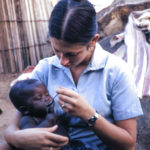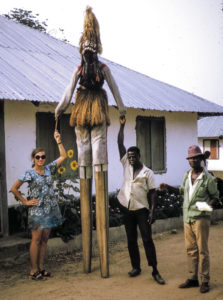A Writer Writes: Value of Life by Susan E. Greisen (Liberia)
A Writer Writes
Value of Life
by Susan E. Greisen (Liberia 1971-73; Tonga 1973-74)
Scaling a thirty-foot tree for palm nuts with bare feet, using a belt fashioned out of a vine, could lead to disaster. The men and boys who managed the task were quite skilled, and equipment failure was rare. But I cringed at the news when I learned of a farmer who had fallen out of a palm tree and sustained a severe injury. Peter, the health assistant from our small clinic, and I, a Peace Corps health volunteer, were summoned to his home. Walking thirty minutes to his village, we found Abdou lying flat in his round thatched hut. This soft-spoken father of four — ages two, three, five, and seven — had two wives, one pregnant. His supportive family was willing to do whatever was necessary to help him.
After quickly assessing the situation, we were relieved that the man had no pain. Peter and I performed a rudimentary evaluation. Peter asked, “Abdou, move your hands and arms.” Success. Then he asked him, “Move your legs and toes.” No movement.
I said, “Abdou, close your eyes and tell me when you feel something.” I tried to elicit a sensation of his lower extremities by touching his thighs, knees, shins, and toes. He made no response. Next, I pinched the same areas, again no response.
Abdou was paralyzed from the waist down. Unskilled at determining the exact extent of his spinal injury, Peter and I concluded that seeking evaluation and treatment at the nearest hospital would be his best option. We approached the family regarding our plan and they agreed. The following day, with careful instruction to keep him lying flat to reduce further injury, two family members carried Abdou for an hour on a sapling stretcher to our village of Zorgowee. As soon as we acquired transport, two hours later, he headed to the hospital in Sanniquellie, another hour ride on a potholed road in the back of a mattress-padded pickup truck. We were relieved knowing he would receive better care in the hospital than in his village.
Two hours later he returned. The hospital refused his admission without a $10.00 fee. I was furious. I was not going to give up on Abdou, so I sent a note, via taxi, to Pam, a Peace Corps volunteer in Sanniquellie to spread the word among our friends for help. A week later Sister Catherine from the Catholic Mission arrived offering her van to transport him to their airstrip for a mission flight to the capital of Monrovia where he could receive care.
“We have a four-seater prop plane that could transport him. He would not survive the six-eight-hour pickup truck ride to Monrovia,” Sister Catherine said. Again, the family agreed and she transported Abdou and his one wife in the back of her van to the mission airstrip. Surely, he would get the best care now, even better than the Sanniquellie hospital.
Four hours later Sister Catherine returned with her human cargo. Her face told the story, “I never knew the seats of the plane could not be removed for him to lie flat. I’m so sorry.” She was devastated as we all were. Again, our efforts were thwarted.
A month later, with his condition declining, the desperate family took him to the powerful medicine men in Durlay, a village deep into the interior. Country medicine, as it is known, has treated ailments with rituals and herbs for decades before Western medicine was available in our village only a few years earlier.
Several nights later a young boy came to my door, “Miss Sue, I come to tell you Abdou died.”
That night I grieved another preventable loss of life in our small community — four total that month. At the same time, I rationalized his demise, perhaps to preserve my sanity and survive my assignment in this remote part of Liberia. I questioned if Sanniquellie or Monrovia’s medical facilities could have met his needs for treatment and physical recovery. What was I thinking? Liberia didn’t have rehabilitation facilities or long-term care for paraplegics. Treating acute conditions like diarrhea, malaria and pneumonia were more what those hospitals could handle. When I acknowledged the inadequate transport, lack of funds, and insufficient level of care, Abdou’s choice to stay in his village was probably the right one.
Eventually, my frustration turned to understanding, when I grasped what options and choices the villagers had. I never experienced human existence at a basic survival level until I lived in Liberia. Previously, my only knowledge of an expendable life had been with farm animals back home. Dad believed in “survival of the fittest.”
Through Abdou’s death, I gained a new perspective regarding the value of life. Family members must have a role and a function for the greater good. The repair of a broken person — a paraplegic — comes at a cost, both monetarily and in the family’s commitment to providing care. When villagers lived day-to-day and meal-to-meal, caring for a condition like paralysis was not a viable option. By requiring one to two people to meet his needs, Abdou would take those people away from providing for their family as a whole. I could never have imagined this challenge in the U.S.
At just twenty years of age, coming from the farm in Nebraska with a practical nursing certificate, I had so much more to learn. The night I learned of Abdou’s death, I cried myself to sleep. I let go of my unrealistic expectations working in that remote part of Liberia.
Even though Abdou’s family did everything in their power to help him, he was beyond repair . . . for the time and culture in which he lived.
•
 Susan E. Greisen, raised on a remote farm in Nebraska, served two years in Liberia and one year in Tonga as a health education volunteer from 1971-74. As an RN, she later worked for CARE in Cameroon, 1980-82, and has since journeyed to over forty countries on six continents. Susan is a published poet and author, and her travel photographs have been featured online by the BBC News. Susan lives in Bellingham, WA.
Susan E. Greisen, raised on a remote farm in Nebraska, served two years in Liberia and one year in Tonga as a health education volunteer from 1971-74. As an RN, she later worked for CARE in Cameroon, 1980-82, and has since journeyed to over forty countries on six continents. Susan is a published poet and author, and her travel photographs have been featured online by the BBC News. Susan lives in Bellingham, WA.
Susan’s Peace Corps memoir, In Search of Pink Flamingos: A Woman’s Quest for Forgiveness and Unconditional Love, published in 2020, is the winner of the “The Book Garnering the Greatest Number of Positive Comments EVER for It’s Review [by Cynthia Mosca] on Peace Corps Worldwide” . . . 37 rave reviews . . . AND she responded kindly to the comments 22 times!

Brava, Susan, Your story imparted a profound lesson in humility, the limitations of those of us seeking to do good in poor nations, the reality and demands of basic survival, and the value of family where there are no social services.
Patricia Taylor Edmisten, Peru, 1962-64.
Hello Patrica,
Thanks for your comment. Liberia still struggles today post civil wars, AIDS, Ebola and our current pandemic. Through Friends of Liberia (FOL) we are able to some aid and support. Basic survival is daily life for many.
Susan, I had a very similar event in Liberia when a young man who I had supported financially as a Volunteer–also with a couple of kids–fell from a palm tree while trying to get coconuts for his hungry family during the war. My story, “The Road to Wilmont’s Village” in the upcoming Liberian anthology is about him. He unfortunately also passed away from his injuries. I’m still not over it.
Thanks Kathleen,
Yes, I have never forgotten Abdou. So many of us PCVs wished we could have done more. In addition, congratulations on your story mentioned above and that it will be published in our PC Liberia anthology in 2022. Storytelling is powerful and we must continue to share them.
Nice story Susan. You have so many of them, and tell them so well.
Sean. Sullivan
Thanks Sean, You are one of my biggest fans and a person who knows Liberia so very well.